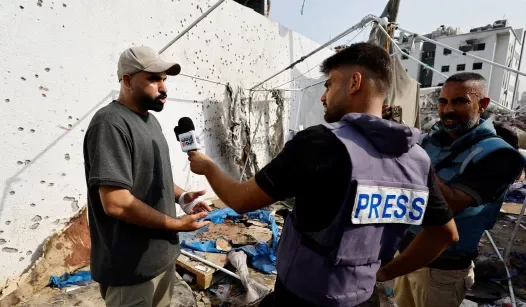The recent controversy surrounding the alleged death of a Palestinian boy has sparked intense debate about the reliability of international media coverage concerning the Israeli-Palestinian conflict. This incident is just one of many that have raised questions about the integrity and accuracy of reporting on this sensitive issue.
As the conflict continues to unfold, the role of the media becomes increasingly crucial. Journalists are tasked with providing accurate and balanced information to the public, yet instances of misinformation and bias have led to a growing skepticism regarding their credibility. The portrayal of events in the region often reflects a complex interplay of political agendas, cultural narratives, and historical grievances, making it challenging for audiences to discern the truth.
In recent years, various media outlets have faced backlash for their reporting on Israel and Palestine. Critics argue that some stories are sensationalized, lacking context or depth, which can perpetuate misunderstandings and deepen divisions. The case of the Palestinian boy, whose death was later revealed to be a fabrication, serves as a stark reminder of the potential consequences of irresponsible journalism. Such incidents not only mislead the public but also contribute to the ongoing cycle of conflict and mistrust between communities.
Moreover, the impact of social media cannot be overlooked. In an age where information spreads rapidly, unverified reports can gain traction before they are properly investigated. This phenomenon has led to a rise in “fake news,” complicating the already fraught landscape of reporting on the Israeli-Palestinian conflict. As individuals share stories that align with their beliefs or emotions, the potential for misinformation to spread increases, further muddying the waters of public discourse.
To restore credibility, media organizations must prioritize accuracy and transparency in their reporting. This includes rigorous fact-checking, providing context for complex issues, and acknowledging the limitations of their coverage. Journalists should strive to present multiple perspectives, allowing audiences to develop a more nuanced understanding of the situation. Engaging with local sources and communities can also enhance the depth of reporting, providing insights that may be overlooked by those outside the region.
Furthermore, audiences play a critical role in holding media accountable. It is essential for readers and viewers to approach news with a critical eye, seeking out reliable sources and verifying information before accepting it as truth. By fostering a culture of media literacy, individuals can better navigate the complexities of reporting and contribute to a more informed public discourse.
As the situation in Israel and Palestine remains volatile, the need for credible journalism has never been more pressing. The international community relies on accurate information to understand the dynamics at play and to advocate for solutions that promote peace and justice. By addressing the challenges facing media coverage and committing to ethical reporting practices, journalists can work toward rebuilding trust and ensuring that the stories of those affected by the conflict are told with integrity and respect.
In conclusion, the erosion of credibility in international reporting on Israel is a multifaceted issue that requires concerted efforts from both media organizations and audiences. By prioritizing accuracy, transparency, and accountability, we can begin to mend the fractures in public trust and foster a more informed dialogue about one of the most enduring conflicts of our time.
